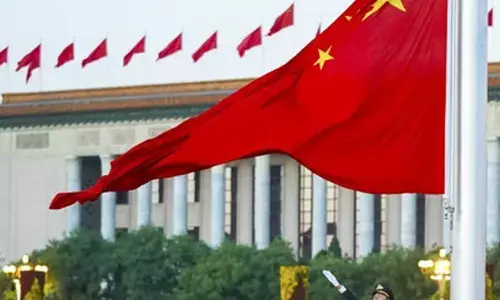Protect tribal rights

Deo urges Odisha Governor in a missive on Vedanta bauxite mining
Venkat Parsa
New Delhi: Close on the heels of his taking up the issue of bauxite mining with Andhra Pradesh Governor E S L Narasimhan, Union Tribal Affairs Minister V Kishore Chandra Deo has now dashed off a missive on Vedanta mining in Niyamagiri Hills in Odisha, to that State Governor S C Jamir.
This move could well trigger a broader debate on the need to safeguard the Scheduled V areas that enjoy statutory guarantees under Article 244 (1) of the Constitution. Recently, in the Vedanta mining case, the Supreme Court designated the Tribal Affairs Ministry, and not the Ministry of Environment and Forests, as the nodal ministry. It could be cue to make the Tribal Affairs Ministry the nodal ministry on all issues relating to the tribals, instead of the Ministry of Environment and Forests, as at present.
The principal threat is the mining in Schedule V areas, which has threatened the confidence of the tribals living in the regions. It could lead to displacement and even alienation of their lands, which would be a flagrant violation of the provisions of the Constitution. The object of Schedule V of the Constitution is to safeguard and preserve the tribal autonomy, their culture and economic empowerment.
The letter was addressed to Odisha Governor Jamir, as under the Constitution, a Governor of Scheduled V State is not bound by the aid and advice of the Council of Ministers in the matters relating to tribals. The Governor has been given unfettered powers under Article 244 (1) of the Constitution in this regard. Deo wanted Jamir to exercise his special powers to safeguard the interests of the tribals in the Niyamagiri Hills area.
In his letter to Jamir, Deo wrote: "Under the powers bestowed upon you under Para 3 of the Schedule V of the Constitution, I urge upon you to kindly intervene and exercise powers to restore the sanctity of the Constitution and to preserve the solemn assurance that has been given by our founding fathers of our Constitution for the protection of tribals and marginalised sections residing in Schedule V areas in the State of Odisha."
Deo also pointed out Vedanta has no locus standi in Scheduled V area, which is meant only for tribals or Government. The MoU with Odisha Mining Corporation (OMC) is also a private arrangement. In fact, the OMC is registered under the Companies Act, 1956, is neither a part nor an arm of the Odisha Government. In case the OMC disinvests its shares and, as a result, Vedanta takes over, the very purpose of the Constitutional safeguards would be defeated. The core issue is the tendency of the State Governments to hand over the land in Scheduled V areas to State Government corporations, which could easily be privatised by selling the majority stake to a private company.
The Supreme Court, in its judgment on the Vedanta issue, had stated that the Gram Sabha has a role to play in safeguarding the customary and religious rights of the STs under the Forest Rights Act and Section 6 of the Act confers powers on the Gram Sabha to determine the nature and extent of individual and community rights. The State Governor, for instance, can ensure that the Gram Sabhas hold meetings mandatorily.









